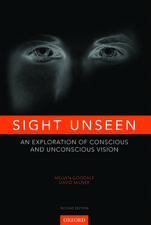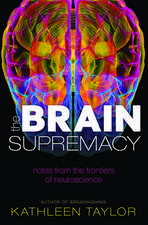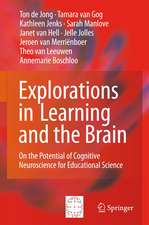Diet — Brain Connections: Impact on Memory, Mood, Aging and Disease
Editat de Mark P. Mattsonen Limba Engleză Hardback – 30 aug 2002
Key topics covered in depth include: -caloric restriction benefit the brain and retard aging;
-effects of dietary antioxidants on brain function and aging;
-developmental and function consequences of different dietary fatty acids;
-biochemical links between dietary folic acid and psychiatric and neurodegenerative disorders;
-effects of nutritional deficit during early development and behavior disorders later in life; -neurochemical basis of the benefits of widely used dietary supplements including creatine and Gingko biloba;
-contribution of dietary toxins such as metals and pesticides to neurological disorders.
| Toate formatele și edițiile | Preț | Express |
|---|---|---|
| Paperback (1) | 943.88 lei 6-8 săpt. | |
| Springer Us – 29 oct 2012 | 943.88 lei 6-8 săpt. | |
| Hardback (1) | 950.03 lei 6-8 săpt. | |
| Springer Us – 30 aug 2002 | 950.03 lei 6-8 săpt. |
Preț: 950.03 lei
Preț vechi: 1158.57 lei
-18% Nou
Puncte Express: 1425
Preț estimativ în valută:
181.78€ • 190.31$ • 150.42£
181.78€ • 190.31$ • 150.42£
Carte tipărită la comandă
Livrare economică 05-19 aprilie
Preluare comenzi: 021 569.72.76
Specificații
ISBN-13: 9781402071294
ISBN-10: 1402071299
Pagini: 270
Ilustrații: X, 270 p.
Dimensiuni: 155 x 235 x 18 mm
Greutate: 0.58 kg
Ediția:2002
Editura: Springer Us
Colecția Springer
Locul publicării:New York, NY, United States
ISBN-10: 1402071299
Pagini: 270
Ilustrații: X, 270 p.
Dimensiuni: 155 x 235 x 18 mm
Greutate: 0.58 kg
Ediția:2002
Editura: Springer Us
Colecția Springer
Locul publicării:New York, NY, United States
Public țintă
ResearchDescriere
Diet-Brain Connections fills a void between the fields of nutrition, behavior and cellular and molecular neurosciences by providing an integrated collection of articles that critically dissect the link between what we eat and how the brain develops and functions in health and disease.
Key topics covered in depth include: -caloric restriction benefit the brain and retard aging;
-effects of dietary antioxidants on brain function and aging;
-developmental and function consequences of different dietary fatty acids;
-biochemical links between dietary folic acid and psychiatric and neurodegenerative disorders;
-effects of nutritional deficit during early development and behavior disorders later in life; -neurochemical basis of the benefits of widely used dietary supplements including creatine and Gingko biloba;
-contribution of dietary toxins such as metals and pesticides to neurological disorders.
This book provides an unprecedented resource for scientists in academia and government labs as well as in the pharmaceutical, nutraceutical and food industries.
Key topics covered in depth include: -caloric restriction benefit the brain and retard aging;
-effects of dietary antioxidants on brain function and aging;
-developmental and function consequences of different dietary fatty acids;
-biochemical links between dietary folic acid and psychiatric and neurodegenerative disorders;
-effects of nutritional deficit during early development and behavior disorders later in life; -neurochemical basis of the benefits of widely used dietary supplements including creatine and Gingko biloba;
-contribution of dietary toxins such as metals and pesticides to neurological disorders.
This book provides an unprecedented resource for scientists in academia and government labs as well as in the pharmaceutical, nutraceutical and food industries.
Cuprins
Preface. 1. Prenatal Choline Supplementation Modifies Brain Development: Improved Cognition and Neuroprotection; C. Williams, E. Mohler. 2. Diet and Mood; D. Benton. 3. Dietary Fatty Acids and Cognitive Function; S. Kalmijn. 4. Dietary Antioxidants and Synaptic Plasticity: Cellular and Molecular Mechanisms; M. Lynch. 5. Increasing Brain Healthspan by Dietary Restriction; M.P. Mattson, J. Lee. 6. Caloric Restriction Versus a Diet High in Antioxidants: Are They Equipotent in Altering or Reversing the Course of Aging? G. Casadesus, et al. 7. Dietary Folate, B Vitamins and The Brain: The Homocysteine Connection; M.P. Mattson, et al. 8. Molecular Actions of Gingko Biloba Extract In Vivo and In Vitro: Global gene expression profiles reveal multiple molecular targets; K. Gohil, L. Packer. 9. Creatine and Gingko Biloba Use in Sports and Health: A Knowledge Utilization Approach; J.D. Geiger, et al. 10. Acetyl-L-Carnite in Mood, Aging and Disease; J.W. Pettegrew, et al. 11. Effects of Phytoestrogens on Brain Chemistry, Structure and Cognition; Yuanlong Pan. 12. Dietary Neurotoxins; L.G. Costa, et al. 13. Dietary Anti-oxidants and the Risk for Brain Disease: The Hypothesis and Epidemiologic Evidence; L.J. Launer. 14. Copper, Zinc and Alzheimer's Disease; A.L. Friedlich, et al. 15. Ethanol Effects on Aging Brain; J. Rintala, P. Jaatinen. Index.
Notă biografică
Mark P. Mattson is Chief of the Laboratory of Neurosciences, National Institute of Aging Gerontology Research Center and a Professor in the Department of Neuroscience, Johns Hopkins University School of Medicine.










